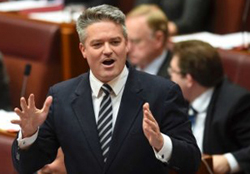Weekly column from Council Courier e-newsletter by LGAQ media executive Craig Johnstone, Friday 5 February 2016
Federal parliament’s start to the year this week meant a ramping up of the political rhetoric ahead of the next election.
There comes a time before every federal poll where the good work of policy formulation is shoved aside by the manoeuvring of the major parties anxious to gain the political upper hand.
Unfortunately for those who value good policy formulation, this hijacking of public debate to satisfy short term political imperatives is happening earlier and earlier in the term.


So it was this week, when the nation’s parliamentarians barely had time to shake the holiday sand off their toes before joining the knock down, drag out fight that is modern political campaigning.
One of the first victims of this fight looks to be a wide-ranging and detailed debate on tax reform. Finance Minister Mathias Cormann this week all but confirmed that the Turnbull Government is about to abandon the previous Abbott government’s efforts to produce a policy White Paper on tax reform.
Instead, the tax debate is being corralled into arguments over a few key issues: an increase in the GST, a winding back of superannuation tax breaks and perhaps some income tax cuts.
Comprehensive reform of Australia’s tax system – reform that includes a good hard look at what services each level of government provides and how to pay for it – is rapidly fading as a realistic prospect.


That, of course, is not the best of news for Queensland councils. Many of them are being forced to provide services in areas that should be the preserve of the State, particularly in the areas of health and education.
Commonwealth support for local governments is a mixed bag. A freeze on increases in Financial Assistance Grants remains in place but the Canberra has upped its support for the Roads to Recovery program. For all that, the flow of Commonwealth funds to local government is a trickle of what it once was.
The prospect of comprehensive tax reform carried the hope that local councils would finally gain access to a set share of the revenue from a growth tax such as the GST. Whether that hope remains achievable anytime soon will depend is now at the mercy of politicians with their eye fixed not on the worthiness of tax reform but their chances of re-election.